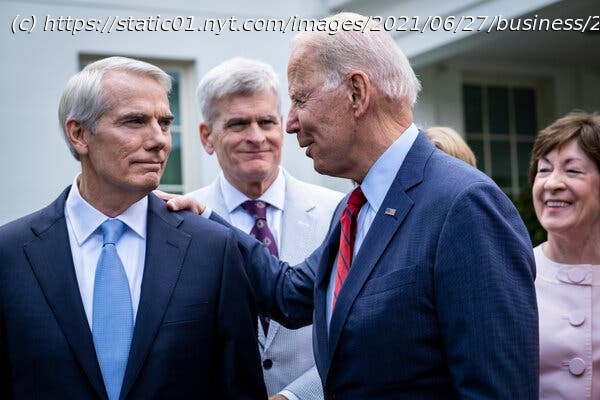Moderate Republicans said they believed that the $1.2 trillion bill, which they suggested they could now begin drafting, would have enough G.O.P. support to pass the Senate.
A fragile bipartisan infrastructure deal appeared to be moving forward once again on Sunday, as moderate Republicans said they had been reassured that President Biden would not hold it hostage while Democrats simultaneously work on a larger, partisan economic package. After 48 hours of chaos, the statements by leading Republicans prompted a sigh of relief for the White House, where Mr. Biden and top aides had worked through the weekend to keep the eight-year, $1.2 trillion investment to rebuild the nation’s infrastructure from falling apart. G.O.P. negotiators even suggested that they could now begin drafting the bill and said they believed it would win enough Republican votes to pass the Senate next month. “The waters have been calmed,” said Senator Mitt Romney, Republican of Utah. Still, the whole episode underscored just how precarious a path the president and his allies face in the months ahead, as they try to steer the two separate and costly spending plans into law. They have laid out a complex strategy in which the success of each bill hinges on the other and the balancing of priorities between not only Republicans and Democrats, but within the Democratic Party itself. While the bipartisan bill can be passed through regular order if it retains enough Republican support, Democratic leaders plan to use a fast-track budget process known as reconciliation to bypass the 60-vote filibuster threshold to enact the other half of Mr. Biden’s agenda, which includes tax increases, sweeping climate plans, health care provisions and investments in child care. If they can pull off both, Mr. Biden could burnish his reputation as a bipartisan deal maker and ensure that much of his economic agenda is locked in place. The immediate cause for Republican concern came just hours after the president and the two parties unveiled with great fanfare on Thursday their plan to invest in crumbling roads, bridges, high-speed internet and green projects. Speaking with reporters later that day, Mr. Biden said he would not sign the bipartisan deal without Congress passing a much more expensive set of tax cuts and spending programs that conservatives loathe.






